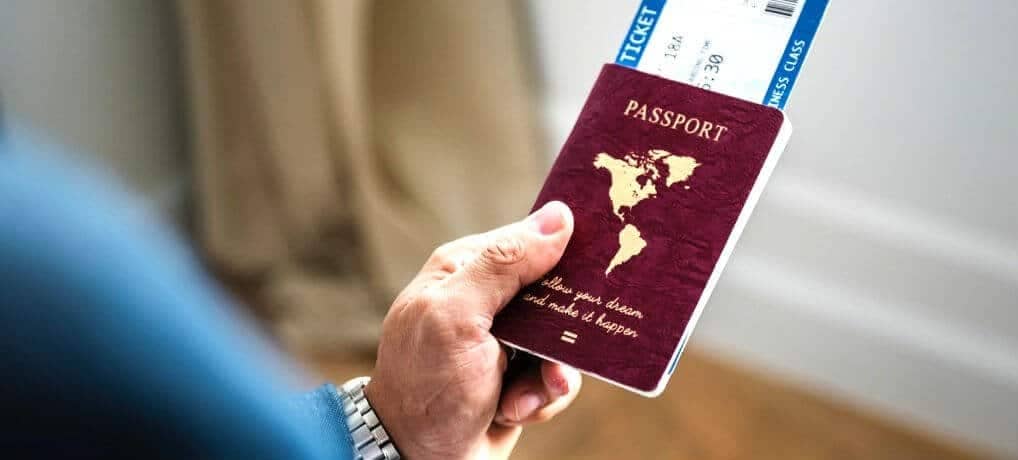Passport advantage and benefits of dual citizenship
I am fortunate to hold dual citizenship on two different continents. However, until now, I’ve never really looked into the benefits this offers me. Frankly, I never gave it much thought because I never had to. After becoming location independent, I started wondering if I should be capitalizing on the advantages of travelling with two different passports. Curious to see how the passport advantage works for others, I asked other bloggers to share their experiences.
With the looming reality of Brexit and the new rules for travel to Europe starting in 2021, the value of having multiple nationalities becomes a serious benefit. So what happens if you are lucky enough to find yourself a multi passport holder? I’ve asked others for their stories and found some really interesting things.
Affiliate Disclosure – This post contains affiliate links. If you make a purchase through these links, I may earn a commission. This doesn’t affect your purchases or any fees you may pay for the product or service. Read more in my DISCLAIMER.
Passport advantage of dual citizenship
Having dual or even multiple nationalities and passports can definitely provide you with an edge when you travel. It also can dictate where you can live and work. I’ve asked others to share their stories mostly because I was curious about their experience. I was also looking for guidance on how to benefit from my dual citizenship.
Chantal from Earth Nomads
Our family of five has three nationalities. Between French, Dutch, American and one green card, we pretty much have ourselves covered for a large part of the planet. It’s awesome when we want to stay in either Europe or the U.S. for longer than the usual tourist visa would allow. Also, if we have an opportunity to make some extra cash, we can legally do so on two continents. We also feel some sense of security being able to be choosy about which document to show in certain countries. I feel that as an American you may not feel as safe travelling to certain parts of the world in the current political climate.
However, it is definitely not all roses when it comes to having multiple nationalities. There is a lot involved when it comes to logistics and finances. Working in multiple places for instance has major tax implications. It’s not necessarily unfair or unreasonable, but imagine having to go through a dreaded, complicated tax day more than once a year. Then there is renewing a passport from outside of your country of citizenship. If your home base is Colorado, like ours, every visit to a consulate requires a 2,500-mile road trip. Keeping up with multiple passports is an expensive hobby in more ways than one.
In addition, you need to keep your head straight and juggle your documents carefully. Leaving one country with one passport and entering the next country with the other passport may seem like a smart idea, and it usually works. Unless you need to prove that you have not overstayed your welcome. The U.S., for example, is extremely strict in allowing you in only on your US passport if you are a citizen. Even with a valid passport from another country and just hopping into Canada for a couple of days, my husband got in trouble. Lesson learned.
Cris from LooknWalk
I have Romanian citizenship by birth and Hungarian ancestry. The only disadvantage of dual citizenship for me is figuring out taxes. Both countries have rather “interesting” laws, so my attorney has been having fun guiding me in the process.
The major advantage of dual citizenship for me is having a Schengen passport. That’s the Hungarian. It definitely has a passport advantage. Romania is not in the Schengen zone nor has an agreement with the U.S., which means that travel there comes with a lengthy and pricy visa procedure. On the other hand, Hungarian nationals get visas on arrival (after filling in an online document). We have had plans to visit for a wedding anniversary – complete with all the research about the passport advantage – but decided against it after the election.
The ease of travel was the main reason we (my husband and I) wanted second citizenship. We flew from Hungary to Italy (so within the Schengen zone) and it was so easy even though Romania is also in the European Union.
I only have one passport: the Hungarian one. I use my Romanian ID card otherwise. My rule is to use the same ID on a trip. If I go to Hungary from Romania, for example, I use my Romanian ID. Also, if I fly out of Romania to other European Union countries, I use my Romanian ID. If I fly out of Hungary, I use my Hungarian passport.
As a certified travel agent, I know all the do’s and don’ts to avoid having issues. I also have to remember to ensure that the plane tickets match the ID I’m carrying. One nagging thing? I have two accounts on my favourite airline – with both citizenships – to benefit from the discounts (you cannot change the name of the “main passenger” and if that passenger isn’t on the trip, no discounts. Sigh)
Kemi from Musings and Adventures
I have both Nigerian and American nationalities as I was born in New York City to Nigerian parents. Seeing as my formative years were spent in Nigeria, I consider myself culturally and ethnically Nigerian first.
I have a U.S. citizenship so that is a huge passport advantage, of course, especially when travelling to countries with a minimal Black population. I don’t feel that as a Black person I get any privileges in the U.S. so having them elsewhere is a good feeling.
Living in the country of my birth, even if I wasn’t raised here, exposed me to the different facets of American history and culture in a way that friends and relatives abroad have not been.
I’m kind of in a funny spot: I left Nigeria as a young teen for school in England and apart from a three-year stint after college; I haven’t lived there in a long while. At the same time, I moved to America for graduate school and I consider New York City home. I still get the “where are you really from?” questions because my hybrid accent is not a stereotypical American twang. My answer depends on my mood.
I personally don’t see any disadvantages to dual citizenship or using two passports. Especially in the west where I only use my U.S. passport. Years ago when I visited Nigeria, the officials on both legs acted difficult because I arrived on a Nigerian passport and was departing on an American one. They feigned ignorance of dual nationality. They finally let me through but my mum said “never again!”
The next time I went, I got a Nigerian visa on my U.S. passport and I was still bothered because the officials on arrival saw my very Nigerian name and asked why I didn’t have a Nigerian passport.
I relayed my previous ordeal, they told me not to worry and explained that immigration officials were becoming more familiarized with dual nationalities. Next time, I should come with both passports and I’d be fine.
James from Portugalist
I’m very lucky in that I have both an Irish and a U.K. passport, although it’s only recently that both have become so valuable to me. Initially, I applied for a British passport in case I lost my Irish passport – something that has happened to me before. Now, I’m very glad to have both (and not to have lost a passport in a long time).
For a long time, both were identical with the exception of a few differences. The U.K. passport can get me a 90-day tourist card in Suriname, for example, whereas if I travel with my Irish passport I would have to apply for a visa. Having a U.K. passport in a situation like this is useful, but it wouldn’t be the end of the world not to have it.
It’s only recently, since the U.K. decided to vote for Brexit, that it’s really become beneficial to have both. U.K. citizens are scrambling to trace their heritage and desperately hoping it leads back to a country in the European Union. That would provide a passport advantage so that they can continue to travel and live freely within the E.U. Having an Irish passport is definitely a big plus here.
European Union citizens who want to live in the U.K. are also looking at their options. Many that have been here for several years are now applying for permanent residency or citizenship. Having a U.K. passport is definitely a big plus here, although it’s also possible that Irish citizens will be able to stay in the U.K. after Brexit. Ireland and the U.K. have a special agreement that predates the European Union, allowing their citizens to move freely between the two countries. I hope that this will be upheld but, just in case it isn’t, I’m very thankful that I have my U.K. passport to fall back on. In this case, the passport advantage is clear.
James from Travel Collecting
I hold both Australian and American nationalities. As an Australian married to an American, living in the U.S., I had a Green Card (permanent resident card) for a few years. As soon as I could, however, I decided to apply for American citizenship, knowing that I could keep my Australian citizenship too. I wouldn’t have done it if I had to give up being Australian – being a tourist in my own country, and not being able to stay for more than a few months if I needed to, seemed too much of a sacrifice.
Even so, I had mixed feelings at first about dual citizenship. It felt strange to take on a new nationality. I don’t love everything being American represents to many people in the world, so I had to come to terms with that. The U.S. requires its citizens to pay taxes even if they live abroad. If I ever decide to move back to Australia, I would pay double taxes. However, I decided to take the plunge because I lived in the U.S. and I wanted to vote. Voting is compulsory in Australia, so Australians grow up with a culture of voting. Not being able to vote at all felt disempowering. I am now happy to be both American and Australian.
I have passports for both countries even though Australian passports are ridiculously expensive. Although I’ve never had any issues travelling with two passports, I mostly travel on my American one because it is easier. When I return from a trip, I’m required to enter the U.S. on my American passport, so unless there is a specific reason to use my Australian passport, it is simpler to use one.
I travel as an Australian in two situations (and can envision a third) – when I go to Australia and when visas or entry fees are significantly cheaper for Australians than for Americans. If I ever wanted to go to a country that had friendlier feelings towards Australians than Americans, I would use my Australian passport then, too. It really is the best of both worlds and gives passport advantage to both.

Michelle Maraj from Travel After Five
I was born in Canada and grew up in the U.S. This granted me both a Canadian and American passport, and I tend to use them interchangeably. The biggest advantage of having two passports is that it opens the door up to how easy it is to access certain countries. Having dual citizenship is helpful for my firm. If we were to have a client in Canada, it would be much simpler for me to travel back and forth.
The biggest disadvantage I have found to having dual nationalities is updating them. I got married last year, and I honestly still have not updated my name on the passports. It is expensive to have to update two passports and prepare all of the paperwork and passport photos.
I personally have not faced any challenges travelling with multiple passports. If I plan on going to a Commonwealth country, I typically bring my Canadian passport. However, since I do live in the U.S., on some occasions I will only travel with my American passport. Whether I travel with both passports or one depends on the country I’m going to and whether I feel like managing both.
My dual citizenship
I have never really given much thought to having dual citizenship. I’ve lived in Canada most of my life and have always travelled on my Canadian passport. It pretty much got me everywhere I needed to go without any problems.
Once we decide to move to Europe, the Canadian passport wasn’t going to cut it as the European Union only allows non-EU citizens to stay for up to 90 days. This changed my mind about having two passports.
By birth, I have Polish citizenship, which makes me an EU citizen. The problem was that my old Polish passport expired over 20 years ago. As a lot of things have changed in Poland since we left, my old passport wouldn’t have been of any use. I decided to apply for a new one, which proved to be a huge hassle. In the end, I got a Polish passport and so far, I haven’t had an opportunity to travel with it.
In summary: Is dual citizenship worth it?
I think having dual citizenship is definitely a plus. Especially if you’re thinking of moving abroad. Whether you take advantage of it is a personal matter. It probably comes down to what nationality you hold and what advantages come with having it.
There are many advantages to having dual citizenship, but not all countries allow their citizens to have another nationality. Obtaining citizenship from another country could make you ineligible to inherit property or vote in the country of your birth. Some countries have strict laws around who can pass on citizenship and how far back in your family tree you can go to be eligible.
Obtaining another citizenship (through ancestry or marriage) can be a complicated and expensive process that can take a long time. Only you can decide whether pursuing it is worth the effort. I recommend you do a lot of research and understand the costs associated with the process before you start planning your move abroad.









